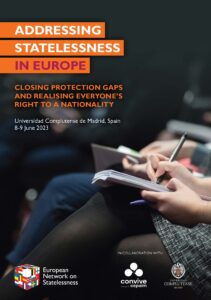-
Search -
Accessibility -
Members Login
European Network on Statelessness
Conference
English, Spanish
Forced migration
The conference will take place on 8-9 June 2023 at the Universidad Complutense Madrid. The event is organised by the European Network on Statelessness in collaboration with Fundación Cepaim and the Universidad Complutense Madrid.
The conference will bring together the insights and perspectives of experts from across Europe, including lawyers, NGOs, stateless activists, refugee community representatives and academics, as well as representatives from regional institutions, governments, inter-governmental-organisations, ombudspersons/monitoring bodies and other stakeholders mandated to work on issues related to statelessness and forced migration.
The programme is designed as an interactive space to facilitate the sharing of information and good practices. The objective is to identify new solutions and galvanise an effective pan-regional strategy to address current gaps and problems. The conference will also include some sessions dedicated to the specific context in Spain, as well as provide a forum to debate opportunities to address statelessness during Spain’s forthcoming Presidency of the EU.
Statelessness affects over half a million people in Europe – both recent migrants and those who have lived in the same place for generations. People become stateless – meaning they are not recognised by any country as a national – because of state succession, gaps in nationality laws, discrimination, displacement, and nationality stripping, among others. Being stateless means people have no legal identity, and the failure to recognise it can result in serious fundamental rights violations, including barriers to being recognised as refugees or to naturalisation, and the risk of being subjected to prolonged and arbitrary detention in the migratory context.
Despite the extent of the problem, many states still lack robust polices to address statelessness. Critically, only a handful of countries in Europe have a dedicated statelessness determination procedure to identify people on their territory without a nationality and to offer appropriate protection status (including residence and other rights under the 1954 Convention) and subsequent naturalisation. Moreover, recent data shows that statelessness is a growing problem that needs to be addressed as part of Europe’s refugee response. According to Eurostat, approximately 3% of those applying for asylum in the European Union are recorded as ‘stateless’ or of ‘unknown nationality’. ENS’s #StatelessJourneys campaign aims to shine a light on this little-understood issue and call on European states to fulfil their duty to protect stateless refugees.
